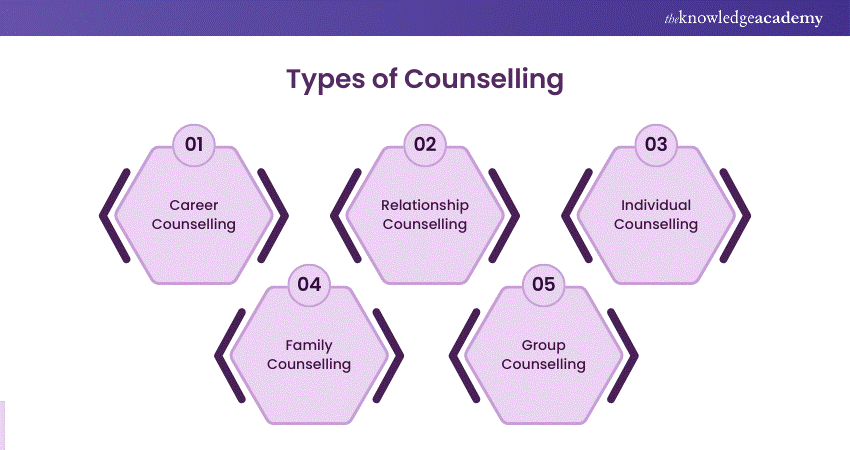A Comprehensive Guide to the Different Kinds Of Coaching and Their Impact
Counseling encompasses a selection of therapeutic strategies, each developed to fulfill distinct mental wellness demands. From the organized techniques of Cognitive-Behavioral Treatment to the empathetic nature of Person-Centered Treatment, these modalities supply unique paths to individual development. Household treatment and Dialectical Behavior modification give extra frameworks for healing, while group counseling cultivates community support. Recognizing these diverse techniques can brighten their extensive impact on private wellness. What continues to be to be explored are the complexities of each approach.

Recognizing Cognitive-Behavioral Therapy (CBT)
Although many restorative techniques exist, Cognitive-Behavioral Therapy (CBT) sticks out because of its organized, goal-oriented nature. This kind of therapy is based upon the property that ideas, sensations, and habits are interconnected, and by changing adverse thought patterns, people can change their emotional feedbacks and actions. CBT utilizes different methods, such as cognitive restructuring, which helps customers identify and challenge distorted ideas. Behavior activation motivates involvement in satisfying tasks to combat depression.
Generally, CBT is a short-term treatment, often long lasting in between 12 to 20 sessions, making it available for those seeking fast results. Its efficiency has been well-documented in dealing with stress and anxiety problems, anxiety, and other mental health and wellness issues. The specialist's duty is to guide clients through workouts and homework projects, fostering self-awareness and promoting long-term coping methods. This sensible method encourages people to take control of their psychological health, ultimately bring about enhanced life contentment.
Exploring Person-Centered Therapy
Person-Centered Treatment, established by Carl Rogers, offers a different method to Cognitive-Behavioral Therapy by highlighting the customer's subjective experience. This therapeutic model prioritizes the person's viewpoint, fostering a setting of empathy, unconditional positive regard, and credibility. By allowing customers to discover their sensations and thoughts without judgment, specialists facilitate personal development and self-discovery.
The core tenet of Person-Centered Treatment is the belief that people have the intrinsic capacity for self-healing and individual growth. In this setting, the specialist functions as a supportive overview instead of a directive authority, urging clients to organize their own journey. This technique is particularly efficient for those coming to grips with concerns such as low self-esteem, anxiousness, or anxiety, as it encourages them to confront and recognize their feelings. Ultimately, Person-Centered Treatment cultivates a strong healing partnership, cultivating count on and openness necessary for purposeful change.
The Duty of Household Treatment in Healing
Household treatment functions as an important element in the healing process for individuals and their connections. This therapeutic approach concentrates on enhancing interaction, solving disputes, and promoting deeper connections amongst household participants. By dealing with dysfunctional dynamics, family therapy encourages each member to express their thoughts and feelings in a safe setting, promoting understanding and empathy.

The effect of household therapy prolongs beyond the sessions, as improved connections can bring about enhanced psychological wellness for all included. Overall, family members treatment plays a crucial function in recovery by promoting unity, resilience, and common support among household participants, inevitably directing them toward a healthier, extra fulfilling life together.
Unloading Dialectical Behavior Modification (DBT)
Structure on the structure of therapeutic strategies that enhance emotional health, Dialectical Behavior modification (DBT) supplies a structured structure for individuals battling with intense emotions and behavior challenges. Developed by Marsha Linehan, DBT integrates cognitive-behavioral strategies with mindfulness practices, aiming to assist clients take care of frustrating feelings and enhance social performance.
The therapy is specifically advantageous for those identified with Borderline Individuality Problem however is likewise relevant to a variety of other psychological wellness concerns. virtual therapy. DBT consists of specific treatment sessions and skills training groups, focusing on 4 vital capability: mindfulness, distress resistance, feeling guideline, and social effectiveness
The Advantages of Team Coaching Procedure
While individual treatment offers important understandings, team therapy sessions use unique advantages that can substantially boost the restorative experience. One important advantage is the sense of area that emerges among individuals. People often locate convenience in sharing their experiences with others dealing with similar obstacles, promoting a helpful atmosphere that lowers feelings of isolation.
Group sessions urge diverse perspectives, enabling participants to discover from each various other's coping strategies and insights. This cumulative knowledge can bring about boosted analytic abilities and a more comprehensive understanding of individual concerns.
Furthermore, group therapy often promotes liability, as participants motivate one an additional to seek their goals and comply with their dedications. Finally, the cost-effectiveness of group therapy makes it an easily accessible alternative for numerous individuals seeking support. Generally, the joint nature of team counseling sessions can significantly enhance the restorative trip.
Regularly Asked Concerns
What Credentials Do Specialists Required to Practice Counseling?
Specialists usually call for a relevant degree in psychology or therapy, along with supervised scientific experience. In addition, they need to get appropriate licensure or certification to exercise legally, making certain adherence to expert requirements and honest guidelines.
How Do I Select the Right Kind Of Treatment for Me?
Choosing the right sort of treatment involves examining personal needs, exploring numerous techniques, considering specialist specializeds, and looking for recommendations. Comprehending individual goals and preferences can greatly boost the effectiveness and complete satisfaction of the healing experience.

Are Online Counseling Sessions as Effective as In-Person Ones?
The performance of online counseling sessions contrasted to in-person ones usually depends on individual preferences and scenarios. Study indicates that both methods can produce favorable outcomes, though some may locate higher convenience in face-to-face interactions.
Exactly How Lengthy Does Therapy Usually Last?

What Should I Expect During My Very First Therapy Session?
During the initial therapy session, clients can expect an introduction, conversation of their problems, establishment of goals, and a summary of the therapy procedure - couples counselling. This initial conference intends to build relationship and assurance comfort